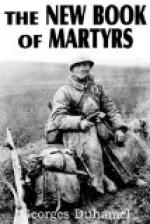“Please give me a cigarette.”
Then he began to smoke, smiling cheerfully and telling absurd stories. We took off one of his legs up to the thigh, and as soon as he recovered consciousness, he asked for another cigarette, and set all the orderlies laughing.
When, on leaving him, I asked this extraordinary man what his calling was, he replied modestly:
“I am one of the employees of the Vichy Company.”
The orderlies in particular, nearly all simple folks, had a desire to laugh, even when they were worn out with fatigue, which made a pretext of the slightest thing, and notably of danger. One of them, called Tailleur, a buffoon with the airs of an executioner’s assistant, would call out at the first explosions of a hurricane of shells:
“Number your arms and legs! Look out for your nuts! The winkles are tumbling about!”
All my little band would begin to laugh. And I had not the heart to check them, for their faces were drawn with fatigue, and this moment of doleful merriment at least prevented them from falling asleep as they stood.
When the explosions came very close, this same Tailleur could not help exclaiming:
“I am not going to be killed by a brick! I am going outside.”
I would look at him with a smile, and he would repeat: “As for me, I’m off,” carefully rolling a bandage the while, which he did with great dexterity.
His mixture of terror and swagger was a perpetual entertainment to us. One night, a hand-grenade fell out of the pocket of one of the wounded. In defiance of orders, Tailleur, who knew nothing at all about the handling of such things, turned it over and examined it for some time, with comic curiosity and distrust.
One day a pig intended for our consumption was killed in the pig-sty by fragments of shell. We ate it, and the finding by one of the orderlies of some bits of metal in his portion of meat gave occasion for a great many jests.
For a fortnight we were unable to go beyond the hospital enclosure. Our longest expedition was to the piece of waste ground which had been allotted to us for a burial ground, a domain the shells were always threatening to plough up. This graveyard increased considerably. As it takes a man eight hours to dig a grave for his brother man, one had to set a numerous gang to work all day, to ensure a place for each corpse.
Sometimes we went into the wooden shed which served as our mortuary. Pere Duval, the oldest of our orderlies, sewed there all day, making shrouds of coarse linen for “his dead.”
They were laid in the earth carefully, side by side, their feet together, their hands crossed on their breasts, when indeed they still possessed hands and feet. ... Duval also looked after the human debris, and gave it decent sepulture.




